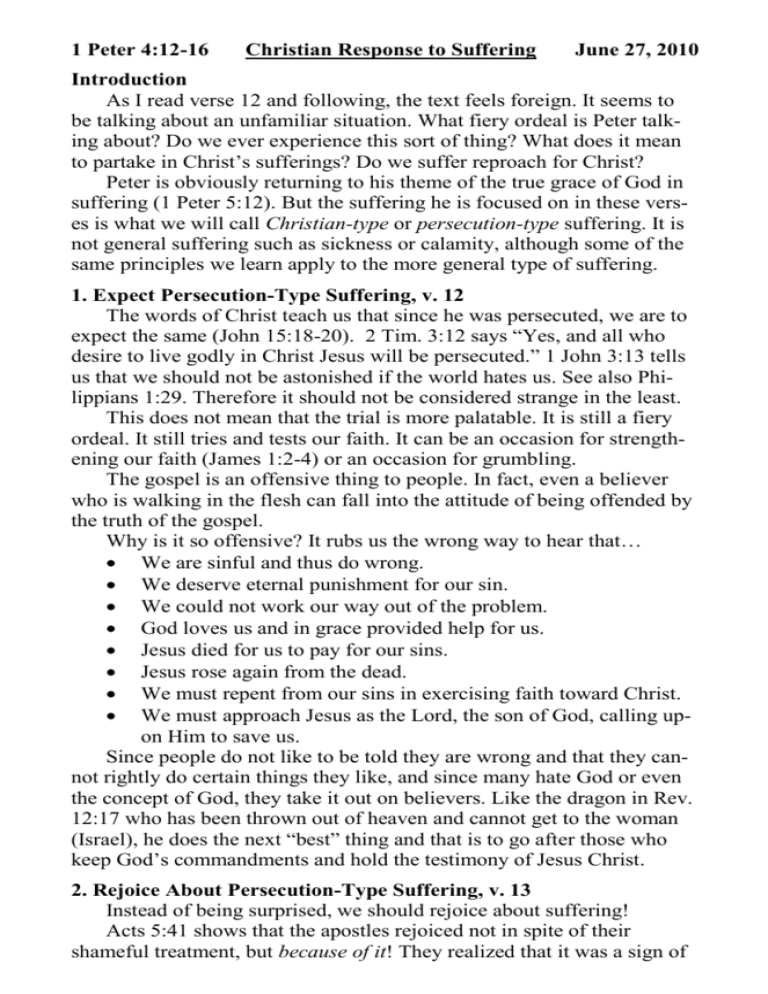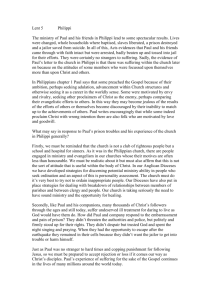1 Peter 4:12-16 Christian Response to Suffering June 27, 2010
advertisement

1 Peter 4:12-16 Christian Response to Suffering June 27, 2010 Introduction As I read verse 12 and following, the text feels foreign. It seems to be talking about an unfamiliar situation. What fiery ordeal is Peter talking about? Do we ever experience this sort of thing? What does it mean to partake in Christ’s sufferings? Do we suffer reproach for Christ? Peter is obviously returning to his theme of the true grace of God in suffering (1 Peter 5:12). But the suffering he is focused on in these verses is what we will call Christian-type or persecution-type suffering. It is not general suffering such as sickness or calamity, although some of the same principles we learn apply to the more general type of suffering. 1. Expect Persecution-Type Suffering, v. 12 The words of Christ teach us that since he was persecuted, we are to expect the same (John 15:18-20). 2 Tim. 3:12 says “Yes, and all who desire to live godly in Christ Jesus will be persecuted.” 1 John 3:13 tells us that we should not be astonished if the world hates us. See also Philippians 1:29. Therefore it should not be considered strange in the least. This does not mean that the trial is more palatable. It is still a fiery ordeal. It still tries and tests our faith. It can be an occasion for strengthening our faith (James 1:2-4) or an occasion for grumbling. The gospel is an offensive thing to people. In fact, even a believer who is walking in the flesh can fall into the attitude of being offended by the truth of the gospel. Why is it so offensive? It rubs us the wrong way to hear that… We are sinful and thus do wrong. We deserve eternal punishment for our sin. We could not work our way out of the problem. God loves us and in grace provided help for us. Jesus died for us to pay for our sins. Jesus rose again from the dead. We must repent from our sins in exercising faith toward Christ. We must approach Jesus as the Lord, the son of God, calling upon Him to save us. Since people do not like to be told they are wrong and that they cannot rightly do certain things they like, and since many hate God or even the concept of God, they take it out on believers. Like the dragon in Rev. 12:17 who has been thrown out of heaven and cannot get to the woman (Israel), he does the next “best” thing and that is to go after those who keep God’s commandments and hold the testimony of Jesus Christ. 2. Rejoice About Persecution-Type Suffering, v. 13 Instead of being surprised, we should rejoice about suffering! Acts 5:41 shows that the apostles rejoiced not in spite of their shameful treatment, but because of it! They realized that it was a sign of partnership with Jesus that they suffered such disgraceful handling by the Jewish San Hedrin Council. Jesus Himself had suffered because of these Jewish leaders; Stephen would later be martyred at their hands as well (Acts 7). We can rejoice about suffering because it develops Christian character in us. We can rejoice in spite of suffering because we know God has something better for us down the line. But, in Peter’s words, we can rejoice in suffering because we become a partner with Jesus Christ in His suffering. To the degree we suffer, we share in His sufferings. He suffers with His people. Since we are united with Him and the world would continue to persecute Him, it persecutes us in His place. Actually when Christians suffer, Christ suffers persecution too because He is integrally interconnected with His people (Acts 9:4-5). This co-suffering gives us assurance of our own salvation. Christ suffered first, and then was brought into His glory (1 Peter 1:11). Our gladness at the glory of Christ will not only be because Christ is glorified, but that we are partaking with Him in that glory. We too went the route of suffering followed by glory, and anticipate the glorious end of sharing in the glory of Christ. Not all are called to the same level of suffering. That’s why Peter says “to the extent” in this verse. The extent of suffering implies a greater or lesser extent of rejoicing. 3. Glorify God Through Persecution-Type Suffering, v. 14 Such suffering brings blasphemy and blessing at the same time. The blasphemy has to do with being reviled or insulted (NKJV: reproached) because we following Jesus and hold His name dear. But as Jesus taught, those who are persecuted are blessed (Matt 5:10-11). Persecution is blessing because it is happier than punishment later. How can we be blessed in such circumstances? Peter says “for the Spirit of glory and of God rests upon you.” Such experiences offer great assurance that we are united with Christ not only in His suffering, but also in His death and resurrection. We are thus assured the Spirit of God is in us and (present tense, continually) rests upon us. For someone who has recognized his moral bankruptcy and utter need of Christ, such a realization could only be a blessing, because by it he knows that he is saved! 4. Do Not Sin so as to Experience Punishment-Type Suffering, v. 15 Here is a short and incomplete checklist of sins that we should not be suffering consequences for: 1. Idolatry, or greed which amounts to it. 2. Carved/molded images. 3. Misusing God’s name, in speech, thought, or writing. 4. Dishonoring parents in practice or heart. 5. Murder, or hatred which amounts to it. 6. 7. 8. 9. 10. 11. 12. Adultery, or lust which amounts to it. Stealing, or jealousy. Lying, false testimony, deception, misleading your authorities Coveting. Marrying an unbeliever (2 Cor. 6:14). General evildoing. Busybody or meddler. The word Peter uses for this is not well attested and some have suggested it means concealing stolen goods or spying. Those would seem to match the more serious nature of the sins that Peter lists. 13. Not attending the meetings of your local church (Heb. 10:2425). What would be the consequences for that? A spiritual life that is not vibrant, does not grow, and does not produce fruit. That is a consequence in itself because these things will bring negative repercussions at the future judgment. 14. Disobeying legitimate authorities, including parents, government, pastors, etc. (Eph. 6:1; Titus 3:1, 1 Peter 2:13; Heb. 13:17). If you are suffering consequences of these sins, you should be ashamed (see v. 16). If you are continuing in these sins, there is no comfort to be found in Peter’s letter. For instance, you cannot claim persecution if you experience penalties or repercussions, because such suffering is what we call justice. It is not persecution. By saying that believers should not suffer for these sins, Peter is saying, in effect, “Do not do these sins.” If you are suffering, it should be for the right reasons. 5. Do Not Be Ashamed About Persecution-Type Suffering, v. 16 The contrast to suffering as a criminal is suffering as a Christian. This type of suffering comes about from doing the right thing—being a Christian—and then being persecuted for doing so. This is one of the three passages where the Bible uses the word “Christian.” Acts 11:26 and 26:28 are the other two places. If you are put in the stocks for your testimony for Christ, you do not have to be ashamed even though that is meant to be a shameful thing. If you are jailed for Christ, you should not be ashamed even though that is generally a shameful thing. If you receive an E on a paper because your teacher cannot stand your Christian perspective, then do not be ashamed, even though a failing grade is normally shameful. It takes a good mindset to “not be ashamed,” but more than that, Peter tells us to glorify God in the matter. How do we do that? First, being ashamed is not glorifying to God. Complaining is not glorifying. Being mad at God is not glorifying. Instead, we should praise God, magnify Him, thank Him for counting us worthy to suffer for Him, and know that we are partners with Christ in His suffering. Some translations put “glorify God in this name” where name is understood to refer to the name Christian. The overall meaning is not too different, but the majority of Greek manuscripts do have “matter.” For Further Study A great example of responding to suffering is found in Paul. In 2 Tim. 1:8, 12, and 16 he reflects Peter’s same attitude of “not being ashamed.” He eventually died because He was a Christian. Notice his attitude about suffering in passages like: Rom 8:17-18 Phil. 3:10 2 Tim. 2:9 2 Cor. 1:5-7 Phil. 4:12 2 Tim. 4:6-8 Gal. 5:11 Col. 1:24 2 Tim. 4:1618 Gal. 6:12 1 Thess. 2:2 Phil. 1:29 1 Thess. 3:4 Paul was not ashamed of suffering for Christ because He was not ashamed of the message of Christ, for it is the power of God for salvation (Romans 1:16). Nor was he ashamed of Christ Himself (Mark 8:38, Luke 9:26). MAP








